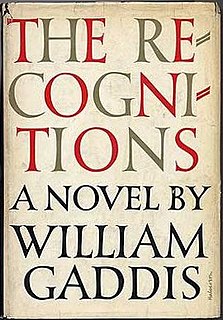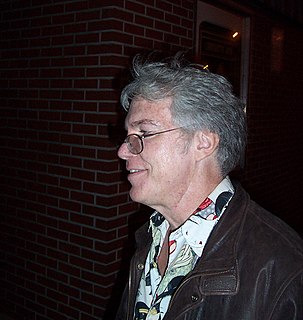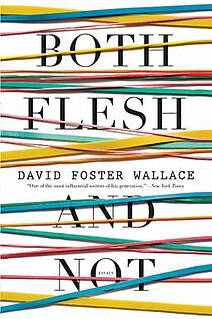 Cover of first edition | |
| Author | William H. Gass |
|---|---|
| Country | United States |
| Language | English |
| Genre | Novel |
| Publisher | New American Library |
Publication date | 1966 |
| Media type | |
| Pages | 336 pp |
Omensetter's Luck is the first novel by William H. Gass, published in 1966.
 Cover of first edition | |
| Author | William H. Gass |
|---|---|
| Country | United States |
| Language | English |
| Genre | Novel |
| Publisher | New American Library |
Publication date | 1966 |
| Media type | |
| Pages | 336 pp |
Omensetter's Luck is the first novel by William H. Gass, published in 1966.
Gass began writing Omensetter's Luck around 1954. He was working on the last chapter of the novel in 1958 when the manuscript was stolen off of his desk, forcing him to begin rewriting the book from scratch. He says of this time, "I was in a funk, a kind of fugue state. I reconstructed the book by working almost nonstop for about six months." [1] The novel was eventually published in 1966 and has gone through many editions, both foreign and domestic, and remains in print today.
Omensetter's Luck takes place in the 1890s in the fictitious town of Gilean, Ohio. The story is bookended by the story of Brackett Omensetter who arrives with his family to settle down. The middle (and the bulk) of the novel is devoted to the spiritual and mental degradation of the town's priest, Jethro Furber, who is jealous of Omensetter's magnetic personality and the luck that seems to underpin Omensetter's existence.
After a meeting to receive his monthly rent, Omensetter's landlord, Henry Pimber, disappears and is found much later, dead. Omensetter's luck changes soon after, forcing him to abandon Gilean, leaving the locals to question the role of Omensetter in Pimber's death.
Omensetter's Luck employs many literary techniques associated with the modernist literary movement, such as the inclusion of several unreliable narrators and the use of stream of consciousness. The novel is structured in three sections: "The Triumph of Israbestis Tott," "The Love and Sorrow of Henry Pimber," and "The Reverend Jethro Furber's Change of Heart," each of which is narrated in the third person. The Jethro Furber section, which is told in stream of consciousness and takes up the majority of the novel, is reported by many readers to be the most difficult section to follow.
In a Paris Review interview, Gass said, "When I first wrote the book, Furber wasn't even in it," and that it was only after rewrites that "Furber began to emerge. The book began to be the book I should have been writing all along. Now, a lot of people find that the Furber section is where the book goes to hell. As far as I am concerned, it is the only justification for that book." [1]
In his Salon article naming five overlooked American novels written after 1960, novelist David Foster Wallace called Omensetter's Luck Gass's "least avant-gardeish, and his best." [2] And Susan Sontag wrote, "William Gass has written an extraordinary, stunning, beautiful book. I admire him and it very much." [3]

David Foster Wallace was an American author of novels, short stories and essays, and a university professor of English and creative writing. Wallace is widely known for his 1996 novel Infinite Jest, which Time magazine cited as one of the 100 best English-language novels from 1923 to 2005. His posthumous novel, The Pale King (2011), was a finalist for the Pulitzer Prize for Fiction in 2012. The Los Angeles Times's David Ulin called Wallace "one of the most influential and innovative writers of the last twenty years".
In literary criticism, stream of consciousness is a narrative mode or method that attempts "to depict the multitudinous thoughts and feelings which pass through the mind" of a narrator. The term was coined by Daniel Oliver in 1840 in First Lines of Physiology: Designed for the Use of Students of Medicine, when he wrote,
If we separate from this mingled and moving stream of consciousness, our sensations and volitions, which are constantly giving it a new direction, and suffer it to pursue its own spontaneous course, it will appear, upon examination, that this, instead of being wholly fortuitous and uncertain, is determined by certain fixed laws of thought, which are collectively termed the association of ideas.

The Anatomy of Melancholy is a book by Robert Burton, first published in 1621, but republished five more times over the next seventeen years with massive alterations and expansions.

Dhalgren is a 1975 science fiction novel by American writer Samuel R. Delany. It features an extended trip to and through Bellona, a fictional city in the American Midwest cut off from the rest of the world by an unknown catastrophe.
Metafiction is a form of fiction which emphasises its own constructedness in a way that continually reminds the audience to be aware they are reading or viewing a fictional work. Metafiction is self-conscious about language, literary form, and story-telling, and works of metafiction directly or indirectly draw attention to their status as artifacts. Metafiction is frequently used as a form of parody or a tool to undermine literary conventions and explore the relationship between literature and reality, life, and art.

William Howard Gass was an American novelist, short story writer, essayist, critic, and philosophy professor. He wrote three novels, three collections of short stories, a collection of novellas, and seven volumes of essays, three of which have won National Book Critics Circle Award prizes and one of which, A Temple of Texts (2006), won the Truman Capote Award for Literary Criticism. His 1995 novel The Tunnel received the American Book Award. His 2013 novel Middle C won the 2015 William Dean Howells Medal.
Postmodern literature is a form of literature that is characterized by the use of metafiction, unreliable narration, self-reflexivity, intertextuality, and which often thematizes both historical and political issues. This style of experimental literature emerged strongly in the United States in the 1960s through the writings of authors such as Kurt Vonnegut, Thomas Pynchon, William Gaddis, Philip K. Dick, Kathy Acker, and John Barth. Postmodernists often challenge authorities, which has been seen as a symptom of the fact that this style of literature first emerged in the context of political tendencies in the 1960s. This inspiration is, among other things, seen through how postmodern literature is highly self-reflexive about the political issues it speaks to.

Infinite Jest is a 1996 novel by American writer David Foster Wallace. The novel has an unconventional narrative structure and includes hundreds of extensive endnotes, some with footnotes of their own.

Robert Stone was an American novelist.
Hysterical realism is a term coined in 2000 by English critic James Wood to describe what he sees as a literary genre typified by a strong contrast between elaborately absurd prose, plotting, or characterization, on the one hand, and careful, detailed investigations of real, specific social phenomena on the other. It is also known as recherché postmodernism.

Wittgenstein's Mistress by David Markson is a highly stylized, experimental novel in the tradition of Samuel Beckett. The novel is mainly a series of statements made in the first person; the protagonist is a woman named Kate who believes herself to be the last human on earth. Though her statements shift quickly from topic to topic, the topics often recur, and often refer to Western cultural icons, ranging from Zeno to Beethoven to Willem de Kooning. Readers familiar with Ludwig Wittgenstein's Tractatus Logico-Philosophicus will recognize stylistic similarities to that work.

Robert Ruark was an American author, syndicated columnist, and big game hunter.

The Recognitions is the 1955 debut novel of US author William Gaddis. The novel was initially poorly received by critics. After Gaddis won a National Book Award in 1975 for his second novel, J R, his first work gradually received new and belated recognition as a masterpiece of American literature.

Lawrence F. McCaffery Jr. is an American literary critic, editor, and retired professor of English and comparative literature at San Diego State University. His work and teaching focuses on postmodern literature, contemporary fiction, and Bruce Springsteen. He also played a role in helping to establish science fiction as a major literary genre.

Oblivion: Stories (2004) is a collection of short fiction by the American writer David Foster Wallace. Oblivion is Wallace's third and last short story collection and was listed as a 2004 New York Times Notable Book of the Year. In the stories, Wallace explores the nature of reality, dreams, trauma, and the "dynamics of consciousness." The story "Good Old Neon" was included in The O. Henry Prize Stories 2002.

The Pale King is an unfinished novel by David Foster Wallace, published posthumously on April 15, 2011. It was planned as Wallace's third novel, and the first since Infinite Jest in 1996, but it was not completed at the time of his death. Before his suicide in 2008, Wallace organized the manuscript and associated computer files in a place where they would be found by his widow, Karen Green, and his agent, Bonnie Nadell. That material was compiled by his friend and editor Michael Pietsch into the form that was eventually published. Wallace had been working on the novel for over a decade. Even incomplete, The Pale King is a long work, with 50 chapters of varying length totaling over 500 pages.

The Tunnel is a novel by the American author William H. Gass published in 1995. The novel took 26 years to write and earned him the American Book Award of 1996, and was also a finalist for the PEN/Faulkner award.

The Marriage Plot is a 2011 novel by the American writer, Jeffrey Eugenides. The novel grew out of a manuscript that Eugenides began after the publication of his sophomore Pulitizer Prize-winning novel, Middlesex. Eugenides has stated that he worked on the novel for about five or six years, and that portions are loosely based on his collegiate and post-collegiate experiences. The book is both a realist story about marriage and a commentary on the kind of story it tells.

Both Flesh and Not: Essays is a collection of fifteen essays by American author David Foster Wallace published posthumously in 2012. It is Wallace’s third essay collection.

Angels is a 1983 novel by American author Denis Johnson. It was Johnson's first novel; previously, he had published several books of poetry. Alice Hoffman, writing for the New York Times, referred to the novel as "a mixture of poetry and obscenity". Angels follows two characters – Jamie, a young mother fleeing her abusive husband, and Bill Houston, a restless ex-convict – who encounter one another on an interstate bus trip. Bill Houston also appears in Johnson's novel Tree of Smoke, which won the National Book Award in 2007.